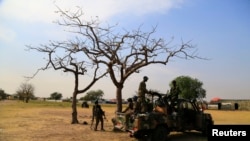Representatives of South Sudan's President Salva Kiir, and rebel leader Riek Machar, are launching peace talks in Ethiopia in a bid to end spiraling civil unrest that has claimed more than 1,000 lives. The peace talks mark the first meeting between the two sides since the conflict erupted in mid-December.
South Sudan's foreign affairs minister, Baranaba Marial Benjamin, says the government is ready to negotiate.
He questions if the opposition has made the same commitment..
"We are for dialogue, unconditional dialogue, without any conditions," he said. "It was the other side putting conditions."
Earlier, the government had rejected one of former Vice President Riek Machar's conditions for talks, the release of his political allies who were jailed in the early days of the crisis.
A Machar delegate, Hussein Mar Nyuot, again called for their release.
"If you keep them in detention and you say you are going for peace, you are not giving a good gesture," he said. "So, we urge President Kiir and we are also asking the international community and members of IGAD [Inter-Governmental Authority on Development] to put pressure for the release of these detainees."
"We don't want our country to degenerate into ethnic fighting," he continued. "We want it to be handled as a political issue to be handled by the government and by the opposition that is fighting. We sit down."
The talks are taking place as fighting continues in South Sudan.
The violence erupted in mid-December. Kiir accused Machar of attempting a coup, a charge Machar denies.
Machar has called Kiir a dictator who tries to silence his critics within the ruling party.
The U.S. envoy to South Sudan, Donald Booth, says the talks in Ethiopia are a good first step toward ending the dispute.
"A very important step to achieving the cessation of hostilities and a beginning to negotiations, to resolve the underline political issues that led to the violence that has gripped South Sudan in the past two weeks," he said.
The ensuing violence between the two sides has forced tens of thousands of people to flee.
Many refugees who have fled fighting in the town of Bor have wound up in Awerial.
Doctors Without Border's David Nash told VOA the village does not have the facilities to cope with the large numbers.
"People have no clean drinking water, no sanitation and everybody is sheltering under the trees. The only water is the Nile," he said. "We are right on the banks of the Nile here and they are using that for washing, for drinking, for bathing, for everything and there are hardly any latrines here, so you can imagine the conditions."
He says many of the refugees at the site are women and children who fled their homes with whatever they could carry.
South Sudan's foreign affairs minister, Baranaba Marial Benjamin, says the government is ready to negotiate.
He questions if the opposition has made the same commitment..
"We are for dialogue, unconditional dialogue, without any conditions," he said. "It was the other side putting conditions."
Earlier, the government had rejected one of former Vice President Riek Machar's conditions for talks, the release of his political allies who were jailed in the early days of the crisis.
A Machar delegate, Hussein Mar Nyuot, again called for their release.
"If you keep them in detention and you say you are going for peace, you are not giving a good gesture," he said. "So, we urge President Kiir and we are also asking the international community and members of IGAD [Inter-Governmental Authority on Development] to put pressure for the release of these detainees."
"We don't want our country to degenerate into ethnic fighting," he continued. "We want it to be handled as a political issue to be handled by the government and by the opposition that is fighting. We sit down."
The talks are taking place as fighting continues in South Sudan.
The violence erupted in mid-December. Kiir accused Machar of attempting a coup, a charge Machar denies.
Machar has called Kiir a dictator who tries to silence his critics within the ruling party.
The U.S. envoy to South Sudan, Donald Booth, says the talks in Ethiopia are a good first step toward ending the dispute.
"A very important step to achieving the cessation of hostilities and a beginning to negotiations, to resolve the underline political issues that led to the violence that has gripped South Sudan in the past two weeks," he said.
The ensuing violence between the two sides has forced tens of thousands of people to flee.
Many refugees who have fled fighting in the town of Bor have wound up in Awerial.
Doctors Without Border's David Nash told VOA the village does not have the facilities to cope with the large numbers.
"People have no clean drinking water, no sanitation and everybody is sheltering under the trees. The only water is the Nile," he said. "We are right on the banks of the Nile here and they are using that for washing, for drinking, for bathing, for everything and there are hardly any latrines here, so you can imagine the conditions."
He says many of the refugees at the site are women and children who fled their homes with whatever they could carry.





